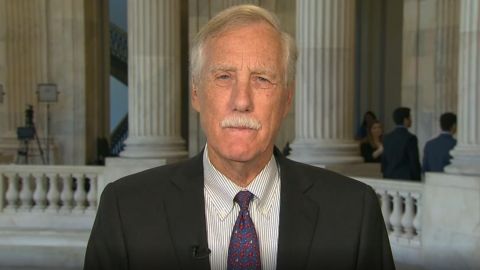Read Transcript EXPAND
SEN. ANGUS KING (I-ME): The administration has decided that it’s going to pick winners and losers here. They had a press conference where they’re giving away $16 billion to farmers in the Middle West who are affected by this trade war. And yet, other businesses, other industries, other interests around the country are not being protected. Lobsters being one of them. Some of our dealers have seen their sales fall something like 85 percent. China was our biggest growth in export market and now it’s fallen practically to zero and the Canadians are taking over the business and they’ll have it into the future. So, it’s just one of those examples of how this trade war is affecting Americans very directly and yet, only some people seem to be under consideration for help.
CHRISTIANE AMANPOUR: Well, before I get to those other some people, let’s just talk about lobsters. I mean, honestly, I guess very few people would have associated lobsters with, you know, a punch in the gut, economically, for your state. Who knew that the Chinese middle-class love lobsters? They’re eating more and more. And that even president Trump served lobster to President Xi at the White House. I hope it was Maine lobster. But paint a picture of proportionally what it does to your state. I mean, how many people are involved in the lobster business, for instance?
KING: Well, it’s a — the business in total is about a $1.4 billion a year business in our state and that includes dealers, lobstermen, people along the retail chain. There are thousands of lobster fishermen, they are essentially independent contractors, they own their own boats, they are small business people. Now, what these tariffs have done is affected dealers who have been selling into China. So far, it hasn’t come back to hitting the boat price but we feel that’s only a matter of time. If you lower demand substantially, you’re going to affect the price. So, it’s a long-term threat. And it’s not the only one, the problem is we’re facing competition from Canada, who has a free trade agreement with the E.U. on lobsters, which we don’t enjoy. So, we’re at a disadvantage there. The steel tariffs affected the price of our steel lobster traps, and we’re also dealing with protecting right whales. So, the lobster industry’s under quite a bit of strain right now and we don’t need additional tariffs that are going to cut off one of our most important growth markets.
AMANPOUR: You know, it’s really interesting that you talk about the steel tariffs that the president’s imposed. And who — you know, I guess what you’ve just illustrated is how all these issues are interconnected right down to the steel for the lobster pot. So, you mentioned that there is — there are billions of dollars in handouts to the Midwest, to the farmers, 16 billion or so. What are you asking for on behalf of the lobster industry?
KING: Well, we calculate that the losses on the exports are about $138 million.
About This Episode EXPAND
Christiane Amanpour speaks with Angus King, Andy Beshear and Abbe Gluck to gain various perspectives on the opioid crisis in the United States. Walter Isaacson talks to historian Rick Atkinson about “The British Are Coming,” the first book in his American Revolution trilogy.
LEARN MORE


